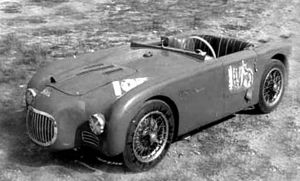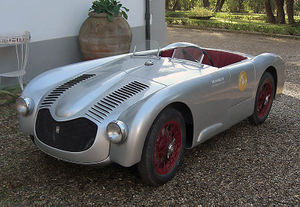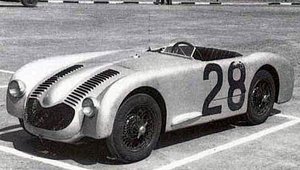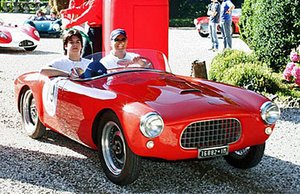Difference between revisions of "Nardi"
m |
m |
||
| (20 intermediate revisions by the same user not shown) | |||
| Line 1: | Line 1: | ||
| − | + | {{X}} | |
[[Image:Nardi Logo2.jpg|center|70px]] | [[Image:Nardi Logo2.jpg|center|70px]] | ||
| − | + | Nardi Danese (1947) following a one off race car built in 1932 (capable of 180km/h with a 65bhp JAP 998cc two-cylinder air-cooled vee engine!), Enrico Nardi worked for a period first for [[Lancia]] and then [[Ferrari]], where he helped create the '''[[AAC 815]]'''. From 1947 he teamed up with [[Ricardo Danese]] as a business partner (hence the use, sometimes, of the name 'Nardi Danese') and produced a very limited number of [[sportscars]]. | |
| − | Nardi Danese (1947) | ||
[[Image:nardi-lancia2.jpg|thumb|350px|left|Nardi-Lancia]] | [[Image:nardi-lancia2.jpg|thumb|350px|left|Nardi-Lancia]] | ||
| Line 10: | Line 9: | ||
These were usually unique, almost always used a tubular chassis and Fiat derived front and rear suspension, and were powered by various engines, frequently 750cc BMW motorbike units, but including items from Alfa Romeo (6C2500 units), Fiat (1100) and Lancia (Aurelia) as well as non-Italian units (Crosley 750's). Bodies were constructed by various carrozzeria, including [[Bertone]], [[Allemano]], [[Frua]] and [[Motto]]. | These were usually unique, almost always used a tubular chassis and Fiat derived front and rear suspension, and were powered by various engines, frequently 750cc BMW motorbike units, but including items from Alfa Romeo (6C2500 units), Fiat (1100) and Lancia (Aurelia) as well as non-Italian units (Crosley 750's). Bodies were constructed by various carrozzeria, including [[Bertone]], [[Allemano]], [[Frua]] and [[Motto]]. | ||
| − | [[Image:3d12_1.jpg|thumb|300px|right|'''The photo shows one of three 1948 series N-D Alfa Romeo cars that are known to remain today even if it is presumed that at least one more probably survives. Nardi-Danese production alternated between these Alfa Romeo powered cars in this "Marco" style, along with two additional Alfa Romeo powered coupe and other smaller cars that had BMW motorcycle engines. At least two additional cars were built 1948, derived from the "Marco" style, one using a Fiat 1100 engine and the other using a prewar Maserati 4CS-1500 engine.''']] | + | [[Image:3d12_1.jpg|thumb|300px|right|'''The photo shows one of three 1948 series N-D [[Alfa Romeo]] cars that are known to remain today even if it is presumed that at least one more probably survives. Nardi-Danese production alternated between these [[Alfa Romeo]] powered cars in this "Marco" style, along with two additional Alfa Romeo powered coupe and other smaller cars that had BMW motorcycle engines. At least two additional cars were built 1948, derived from the "Marco" style, one using a Fiat 1100 engine and the other using a prewar [[Maserati]] 4CS-1500 engine.''']] |
| Line 17: | Line 16: | ||
Gradually the company moved into the field of performance accessories, starting with factory approved kits for [[Lancia Aurelias]] in 1951 and going on to include various models such as the [[Fiat 600]]. They continued to produce components and went on to become famous especially for their steering wheels. Enrico Nardi passed away at the age of 59 in 1966. | Gradually the company moved into the field of performance accessories, starting with factory approved kits for [[Lancia Aurelias]] in 1951 and going on to include various models such as the [[Fiat 600]]. They continued to produce components and went on to become famous especially for their steering wheels. Enrico Nardi passed away at the age of 59 in 1966. | ||
| − | [[ | + | |
| − | [[Image:750Nardi.jpg|thumb|300px|right|'''750 | + | |
| + | |||
| + | '''Ufficine Nardi''' was an [[Italy|Italian]] [[automobile]] and [[racing car]] maker, named for their creator. | ||
| + | |||
| + | [[Enrico Nardi]] was a [[racing mechanic]], [[racing engineer|engineer]], and [[racing driver|driver]] who got his start with [[Lancia]]. He test drove the first car built by [[Scuderia Ferrari|Auto Avio Costruzione]] in [[Modena, Italy|Modena]], where many ex-Lancia colleagues joined him. | ||
| + | |||
| + | In 1932, Nardi joined with [[Augusto Monaco]] to create the '''Nardi-Monaco ''Chichibio'''''. It used an [[aircooling|air-cooled]] 998 cc 61 c [[JA Prestwich Industries Ltd|JAP]] of 65bhp, 10bhp more than the 1750 cc (107 in<sup>3</sup>) [[Alfa Romeo]]s of its competition, transversely-mounted and coupled to a five-speed [[gearbox]], but unusually, driving the front wheels. Weighing only 672lb, it proved capable of 180km/h. This was enough to win several Italian [[hillclimb]]s, including by [[Giulio Aymini]] in 1932. | ||
| + | |||
| + | Beginning in 1948, Nardi joined with and [[Renato Danese]] and established a workshop in ''Via Vincenzo Lancia'', [[Torino]], building racing cars, prototypes, and small-series special designs. | ||
| + | |||
| + | The ''750 Nardi-Danese'' or 750ND was a tiny machine, starting with a [[Fiat 500]] chassis, powered by a 50bhp 746 cc [[BMW]] [[flat twin]] motorcycle engine in the extreme nose, its [[cylinder head]]s (sometimes) exposed, a single headlight in the extreme nose. Despite the engine mounting, view over the nose was adequate, and unlike the ''Chicibio'', the rear wheels were driven. It used a multi-tube chassis and was available as a ''monoposto'' (one-seater, or [[Grand Prix|GP]] type) or ''due posti'' (two-seater, [[sports car racing|sports racer]], when fitted with [[Fender (vehicle)|cycle fender]]s). | ||
| + | |||
| + | Its competition, mostly superannuated [[MG]] [[MG Midget|Midget]]s were no match for it, though it faced more competition from [[Ilario Bandini|Bandini]]s. The miniature marvel dominated circuit, hillclimb, and open road events. Nardi himself raced the ''monoposto'' in the ''[[Coppa d'Oro delle Dolomiti]]'' 'climb, winning in both 1947 and 1948. There were also three entered in the 1952 [[Targa Florio]]; all failed to finish. The 750ND remained competitive well into 1953, against the growing power of Ferrari and Maserati; at the [[Susa-Moncenisio]] 'climb, a 750ND was eighth, only 2% slower than the Ferrari of [[André Simon]]. It also made reputations for a couple of drivers, in particular later [[Lancia]] pilot [[Gino Valenzano]]. | ||
| + | |||
| + | For 1947, the '''Nardi-Danese 1500 sport''' was built for [[Marco Crespi]], coupling two 746 cc in series on an [[Auto Avio Costruzioni 815]] chassis. | ||
| + | |||
| + | Around the same time, he traced the original [[Ferrari]] straight-eight castings, made in [[Bologna]], and fitted them with 508 heads and an assortment of internal parts, to create a 1½ liter and a 2 liter car. | ||
| + | |||
| + | In 1948 and 1949, the company built [[Alfa Romeo 6C]] 2500 variations in two series. | ||
| + | |||
| + | Nardi established his own workshop in the ''Via Lancia'' in 1951, focusing on prototypes and tuning equipment. Here, he designed or built several prototypes, including: | ||
| + | *a ''monoposto'' with a 500cc [[Carru]] flat twin. | ||
| + | *a 1952 [[Formula 2|F2]] prototype developed with [[Gianni Lancia]] using mid/rear-mounted 160bhp [[Lancia Aurelia]] V6 engine, fitted with six [[Dell'Orto]] [[carburettor]]s and Nardi's own head and [[camshaft]]. It featured aluminum bodywork by [[Rocco Motto]] (who also bodied Bandinis) | ||
| + | *two ''Raggio Azzurro'' (''Blue Ray'') prototypes (the B20 in 1955, B24 in 1958), bodied by [[Michelotti]] and built by [[Vignale]] on 4th-series Aurelias. | ||
| + | *the '''4CV''', powered by a 750 cc [[Panhard]], intended for the 1953 [[Le Mans]], as well as the 750 LM [[Crosley]] in 1950-54. A 750 Spider was presented at 37th Paris Salon in 1950, bodied by [[Pietro Frua]]. | ||
| + | *The unusual ''Bisiluro Damolnar'' (''bisiluro'' meaning ''twin torpedo''), with the aid of [[Mario Damonte]] and [[Carlo Mollino]]. Following the lead of [[Piero Taruffi]]'s [[Cisitalia]] ''Tarf'' record-breaker of 1948 and the Pegaso that failed to start at [[Le Mans]] in 1953, it was a twin-boom model (separated by airfoils), with a twin-cam 737 cc Gianni engine producing 62bhp at 7000 rpm and [[tandem]] wheels in one boom, driver and tandem wheels in the other. Weighing 450kg, it was capable of up to 216mi/h, it started at Le Mans in 1955, falling out early. It currently resides in the Leonardo Da Vinci Museum in Milano. | ||
| + | *''Silver Ray'' was 350 bhp [[Plymouth]] [[Chrysler B engine|Golden Commando]] V8-engined, [[Michelotti]]-bodied coupē, built for [[James Simpson]] in 1960. | ||
| + | |||
| + | *single-seater on [[VW Beetle]] components, [[Formula Vee]] prototype for [[Hubert Brundage]] (1959). | ||
| + | |||
| + | After the failure of the ''bisulruo'', '''''Ufficine Nardi''''' ceased work on car prototypes in the mid-1950s and turned to aftermarket such as manifolds, crankshafts, camshafts. It has become best known for the Nardi steering wheel, introduced in 1951 in | ||
| + | [[walnut]], since but mostly using African [[mahogany]]. The Nardi wheel was first fitted to a 1952 [[Pegaso]]. | ||
| + | |||
| + | After Nardi's death in 1966, the ''ufficine'' was run by ''[[Barbero]]'' until 1969, then by ''[[Iseglio]]''. | ||
| + | |||
| + | |||
| + | |||
| + | [[File:1947 Nardi 947 Boby Sport.jpg|left|300px|thumb|'''1947 Nardi 947 Boby Sport''']] | ||
| + | [[File:Nardi-Danese 750S Boby.jpg|right|300px|thumb|'''1947 Nardi 947 Boby Sport''']] | ||
| + | [[Image:750Nardi.jpg|thumb|300px|right|'''1947 Nardi Danese 750 Sport''']] | ||
[[Image:BRUNORI = NARDI - SPORT - 750 cc. - 1955.jpg|thumb|300px|right|'''1955 Nardi Sport 750 cc''']] | [[Image:BRUNORI = NARDI - SPORT - 750 cc. - 1955.jpg|thumb|300px|right|'''1955 Nardi Sport 750 cc''']] | ||
| − | [[Image:MASINI - BONINI = NARDI DANESE = 815 SPORT - 1947.jpg|thumb|300px|right|'''Nardi Danese 815 | + | [[File:1958 Nardi-Vignale 750.jpg|thumb|left|300px|'''1958 Nardi [[Vignale]] 750''']] |
| + | [[Image:MASINI - BONINI = NARDI DANESE = 815 SPORT - 1947.jpg|thumb|300px|right|'''1947 Nardi [[Danese]] 815 Sport''']] | ||
| + | [[File:Nardi Silver Ray.jpg|thumb|left|300px|'''Enrico Nardi commissioned Giovanni [[Michelotti]] [[carrozzeria]] of the "Silver Ray". This car whose frame tubes and a large section of an Alfa Romeo 4500 belonged to the driver [[Felice Bonetto]], Plymouth mounted eight-cylinder engine with 320 hp, capable of a speed of 240 km/h. This unique vehicle was to be the first for them in a series of cars for U.S. market.''']]{{-}} | ||
| + | |||
| + | <gallery> | ||
| + | File:1954 Nardi 750 Corsa 1.jpg|'''1954 Nardi 750 Corsa''' | ||
| + | File:1954 Nardi 750 Corsa 2.jpg | ||
| + | File:1954 Nardi 750 Corsa 3.jpg | ||
| + | </gallery> | ||
| Line 29: | Line 75: | ||
| + | [[Image:nardi-anni50.jpg|thumb|right|150px]] | ||
| + | {{-}} | ||
| + | {{A-Z multipage list|Car Information and Photos by Marque|Information and Photos by Marque|}} | ||
| + | {{A-Z multipage list|Motorcycle Information and Photos by Marque|Motorcycle Information and Photos by Marque|}} | ||
{{Car Information and Photos by Marque}} | {{Car Information and Photos by Marque}} | ||
{{Motorcycle Information and Photos by Marque}} | {{Motorcycle Information and Photos by Marque}} | ||
Latest revision as of 21:52, 18 March 2013
Nardi Danese (1947) following a one off race car built in 1932 (capable of 180km/h with a 65bhp JAP 998cc two-cylinder air-cooled vee engine!), Enrico Nardi worked for a period first for Lancia and then Ferrari, where he helped create the AAC 815. From 1947 he teamed up with Ricardo Danese as a business partner (hence the use, sometimes, of the name 'Nardi Danese') and produced a very limited number of sportscars.
These were usually unique, almost always used a tubular chassis and Fiat derived front and rear suspension, and were powered by various engines, frequently 750cc BMW motorbike units, but including items from Alfa Romeo (6C2500 units), Fiat (1100) and Lancia (Aurelia) as well as non-Italian units (Crosley 750's). Bodies were constructed by various carrozzeria, including Bertone, Allemano, Frua and Motto.
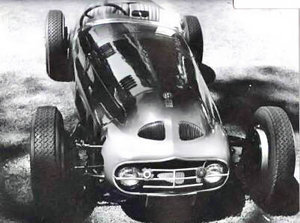
Nardi Danese 2500 Sport Notable was also the 'Bisiluro' which competed unsuccessfully at Le Mans in 1955. A twin-boom vehicle, the pilot was seated in one 'pod' whilst the Giannini 750cc engine was located in the other. This proved, however, to be effectively the end of car production, with a few exceptions including a couple of Lancia Aurelia based concept cars in 1955.
Gradually the company moved into the field of performance accessories, starting with factory approved kits for Lancia Aurelias in 1951 and going on to include various models such as the Fiat 600. They continued to produce components and went on to become famous especially for their steering wheels. Enrico Nardi passed away at the age of 59 in 1966.
Ufficine Nardi was an Italian automobile and racing car maker, named for their creator.
Enrico Nardi was a racing mechanic, engineer, and driver who got his start with Lancia. He test drove the first car built by Auto Avio Costruzione in Modena, where many ex-Lancia colleagues joined him.
In 1932, Nardi joined with Augusto Monaco to create the Nardi-Monaco Chichibio. It used an air-cooled 998 cc 61 c JAP of 65bhp, 10bhp more than the 1750 cc (107 in3) Alfa Romeos of its competition, transversely-mounted and coupled to a five-speed gearbox, but unusually, driving the front wheels. Weighing only 672lb, it proved capable of 180km/h. This was enough to win several Italian hillclimbs, including by Giulio Aymini in 1932.
Beginning in 1948, Nardi joined with and Renato Danese and established a workshop in Via Vincenzo Lancia, Torino, building racing cars, prototypes, and small-series special designs.
The 750 Nardi-Danese or 750ND was a tiny machine, starting with a Fiat 500 chassis, powered by a 50bhp 746 cc BMW flat twin motorcycle engine in the extreme nose, its cylinder heads (sometimes) exposed, a single headlight in the extreme nose. Despite the engine mounting, view over the nose was adequate, and unlike the Chicibio, the rear wheels were driven. It used a multi-tube chassis and was available as a monoposto (one-seater, or GP type) or due posti (two-seater, sports racer, when fitted with cycle fenders).
Its competition, mostly superannuated MG Midgets were no match for it, though it faced more competition from Bandinis. The miniature marvel dominated circuit, hillclimb, and open road events. Nardi himself raced the monoposto in the Coppa d'Oro delle Dolomiti 'climb, winning in both 1947 and 1948. There were also three entered in the 1952 Targa Florio; all failed to finish. The 750ND remained competitive well into 1953, against the growing power of Ferrari and Maserati; at the Susa-Moncenisio 'climb, a 750ND was eighth, only 2% slower than the Ferrari of André Simon. It also made reputations for a couple of drivers, in particular later Lancia pilot Gino Valenzano.
For 1947, the Nardi-Danese 1500 sport was built for Marco Crespi, coupling two 746 cc in series on an Auto Avio Costruzioni 815 chassis.
Around the same time, he traced the original Ferrari straight-eight castings, made in Bologna, and fitted them with 508 heads and an assortment of internal parts, to create a 1½ liter and a 2 liter car.
In 1948 and 1949, the company built Alfa Romeo 6C 2500 variations in two series.
Nardi established his own workshop in the Via Lancia in 1951, focusing on prototypes and tuning equipment. Here, he designed or built several prototypes, including:
- a monoposto with a 500cc Carru flat twin.
- a 1952 F2 prototype developed with Gianni Lancia using mid/rear-mounted 160bhp Lancia Aurelia V6 engine, fitted with six Dell'Orto carburettors and Nardi's own head and camshaft. It featured aluminum bodywork by Rocco Motto (who also bodied Bandinis)
- two Raggio Azzurro (Blue Ray) prototypes (the B20 in 1955, B24 in 1958), bodied by Michelotti and built by Vignale on 4th-series Aurelias.
- the 4CV, powered by a 750 cc Panhard, intended for the 1953 Le Mans, as well as the 750 LM Crosley in 1950-54. A 750 Spider was presented at 37th Paris Salon in 1950, bodied by Pietro Frua.
- The unusual Bisiluro Damolnar (bisiluro meaning twin torpedo), with the aid of Mario Damonte and Carlo Mollino. Following the lead of Piero Taruffi's Cisitalia Tarf record-breaker of 1948 and the Pegaso that failed to start at Le Mans in 1953, it was a twin-boom model (separated by airfoils), with a twin-cam 737 cc Gianni engine producing 62bhp at 7000 rpm and tandem wheels in one boom, driver and tandem wheels in the other. Weighing 450kg, it was capable of up to 216mi/h, it started at Le Mans in 1955, falling out early. It currently resides in the Leonardo Da Vinci Museum in Milano.
- Silver Ray was 350 bhp Plymouth Golden Commando V8-engined, Michelotti-bodied coupē, built for James Simpson in 1960.
- single-seater on VW Beetle components, Formula Vee prototype for Hubert Brundage (1959).
After the failure of the bisulruo, Ufficine Nardi ceased work on car prototypes in the mid-1950s and turned to aftermarket such as manifolds, crankshafts, camshafts. It has become best known for the Nardi steering wheel, introduced in 1951 in walnut, since but mostly using African mahogany. The Nardi wheel was first fitted to a 1952 Pegaso.
After Nardi's death in 1966, the ufficine was run by Barbero until 1969, then by Iseglio.
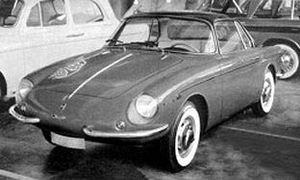
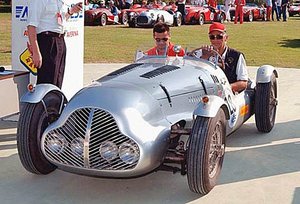
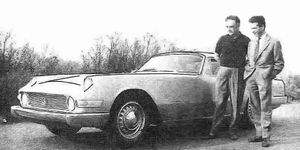
External Links
- Some Info provided by CarsFromItaly.net
- Some pics provided by Etceterini.com
| Car Information and Photos by Marque: A - B - C - D - E - F - G - H - I - J - K - L - M - N - O - P - Q - R - S - T - U - V - W - X - Y - Z |
| Motorcycle Information and Photos by Marque: A - B - C - D - E - F - G - H - I - J - K - L - M - N - O - P - Q - R - S - T - U - V - W - X - Y - Z |
